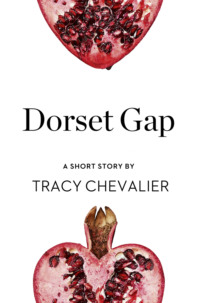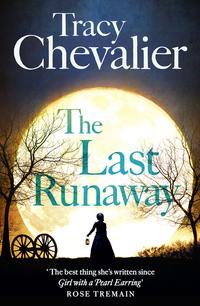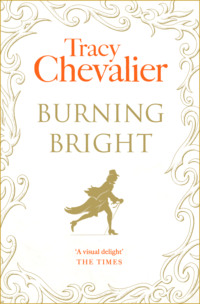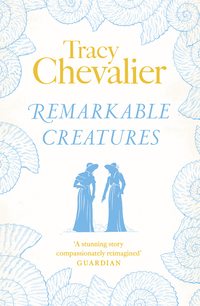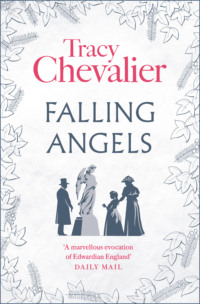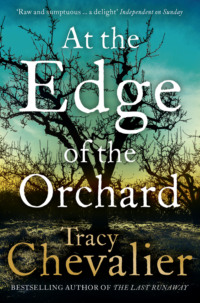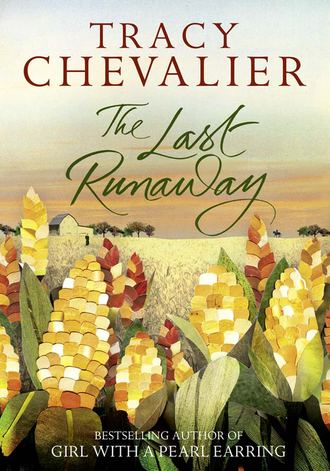
Полная версия
The Last Runaway
Better than that, Honor thought but did not say. ‘She taught me.’
‘Maybe while you’re here you can help me out. Usually I’m not so busy once the Easter-bonnet rush is over, but it’s heated up all of a sudden and everybody’s decided they want a new bonnet, or new trim on their hats.’
Honor nodded in confusion. She was not expecting to remain in Wellington, but to go immediately on to Faithwell. It was only seven miles away, and she hoped to find another farmer with a wagon to take her, or get a boy to ride there with a message for Adam Cox to come and fetch her. The thought of seeing him so soon filled her with dread, though; she did not know if he would welcome her as warmly without Grace at her side.
Donovan interrupted her thoughts. ‘Jesus Christ, is this what you gals talk about all day? Dresses and bonnets?’
The customers had been soothed enough by Belle’s chat to go back to browsing the merchandise. Hearing Donovan’s tone, however – so alien to a millinery shop – they froze once again.
‘Nobody asked you to come here and listen to us,’ Belle countered. ‘Get out of here – you’re scaring my customers.’
‘Honor Bright, are you stayin’ here?’ Donovan demanded. ‘You didn’t tell me that before. Thought you said you was headed to Faithwell.’
‘You keep out of her business,’ Belle said. ‘Old Thomas told me you was botherin’ her on the road. Poor Honor has had to meet the lowest of Ohio society before she’s even had a chance to catch her breath.’
Donovan was ignoring Belle, his eyes still on Honor. ‘Well, now, guess I’ll see you round Wellington, Honor Bright.’
‘Mr Donovan, may I have my key back, please?’
‘Only if you call me Donovan. Can’t stand Mister.’
‘All right – Donovan. I would like my key back, please.’
‘Sure, darlin’.’ Donovan moved his hand, but then stopped. ‘Aw, sorry, Honor Bright, I lost it on the road.’ He held her eyes so that she would know he was lying but could not accuse him. His expression was no longer guarded, but intent, and interested. Her stomach twisted with a mixture of fear and something else: excitement. It was such an unsuitable sensation that she flushed.
Donovan smiled. Then he lifted his hat to the room and turned to go. As he reached the door Honor saw around the back of his neck a thin line of dark green ribbon.
The second he was gone the women began chattering like chickens riled by the sight of a fox.
‘Well, Honor Bright, looks like you’ve already made a conquest,’ Belle remarked. ‘Not one you’d ever want to take up with, though, I can guarantee that. Now, you must be starved. You didn’t eat nothin’ last night, and little on the road, I bet. Ladies’ – she raised her voice – ‘you all go on home and get dinner on the table. I got to feed this weary traveller. You want to buy something, come back in an hour or two. Mrs Bradley, I’ll have your bonnet ready tomorrow. Yours too, Miss Adams. Now I got a good sewer with me I can catch up.’
Honor watched the women obediently filing out, and confusion threatened to overwhelm her. Her life seemed to be in the hands of strangers – where she was going and where she stayed and for how long, what she ate and even what she sewed. It seemed now she was to make bonnets for a woman she had just met. Her eyes pricked with tears.
Belle Mills must have seen them, but said nothing, simply hung a closed sign on the door and went back to the kitchen, where she heaped a ham steak and several eggs into a skillet. ‘Come, eat,’ she commanded a few minutes later, setting two plates on the table. Clearly cooking was not something she spent much time on. ‘Look, there’s cornbread there, and butter. Help yourself.’
Honor gazed at the greasy ham, the eggs flecked with fat, the stodgy cornbread she’d had at every meal in America. She did not think she could face eating any of it, but since Belle was watching her, she cut a tiny triangle of ham and popped it in her mouth. The sweet and salt together surprised her, and opened a door in her belly. She began to eat steadily, even the cornbread she was so tired of.
Belle nodded. ‘Thought so. You were looking mighty pale. When did you leave England?’
‘Eight weeks ago.’
‘When did your sister die?’
Honor had to think. ‘Four days ago.’ Already it felt like months and miles away. Those forty miles between Hudson and Wellington had taken her deeper into a different world than any of the rest of the journey.
‘Honey, no wonder you’re peaky. Thomas told me you’re going on to Faithwell, to your sister’s fiancé.’
Honor nodded.
‘Well, I sent him word you’re here. Told him to come Sunday afternoon to pick you up. I figured you need a few days to recover. You can help me with some sewing if you want. Earn your keep.’
Honor could not remember what day it was. ‘All right,’ she agreed blindly, relieved to let Belle take charge.
‘Now, let’s see what you can do with a needle. You got your own sewing things or you want to use some of mine?’
‘I have a sewing box. But it is locked in the trunk.’
‘Damn that Donovan. Well, I can probably get it open with a hammer and chisel as long as you don’t mind me breakin’ the lock. All right? We don’t have much choice.’
Honor nodded.
‘You do the dishes and I’ll work on the trunk.’ Belle surveyed the table, Honor’s clean plate and her own, almost untouched. Picking up the latter, she set it on the sideboard with a napkin over it. Then she disappeared upstairs. A few minutes later, as Honor was scrubbing the pan, she heard banging and then a triumphant shout.
‘English locks ain’t any better’n American,’ Belle announced as she came downstairs. ‘It’s broken now. Go and get your sewing things. I’ll finish up here.’
When Honor brought her box down, Belle was dragging a rocking chair through the back door. ‘Let’s set on the back porch, catch the breeze. You want this rocker, or a straight chair?’
‘I will bring out a straight chair.’ Honor had seen rocking chairs everywhere she went in America; they were much more common than in England. The sensation reminded her too much of the ship. Besides, she needed solid stillness for sewing.
As she picked up a chair in the kitchen, she noticed Belle’s plate of food on the sideboard was gone.

The milliner’s was on the end of a row of buildings that included a grocery, a harness shop, a confectionary and a drug store. The back yards of these establishments were underused, though one had a vegetable garden, and in another there was laundry hanging out. Belle’s yard had nothing in it but a pile of planed wood and a goat tethered in the weeds. ‘Don’t go near the wood,’ Belle warned. ‘Snakes there. And leave that goat be. It belongs to the neighbours, and it’s evil.’ There was also an outhouse, and a lean-to along the side of the house for storing wood, but clearly Belle’s energy went into her shop.
Honor sat and opened her sewing box to lay out her things. This ritual, at least, was familiar. The sewing box had belonged to her grandmother, who, when her sight began to fail, handed it on to the best stitcher among her granddaughters. Made of walnut wood, it had a padded needlepoint cover of lilies of the valley in green and yellow and white. This was an image Honor had known from an early age; eyes shut, she could perfectly recreate it in her mind, as she had often done to distract herself during her seasickness. The upper tray contained a needlecase Grace had made, embroidered with lilies of the valley similar to the box lid; a wire needle threader; a porcelain thimble her mother had given her, decorated with yellow roses; a beaded pin cushion her friend Biddy had made for her; packets of pins wrapped in green paper; a small tin holding a lump of beeswax she used on her quilting thread; and her grandmother’s pair of small sewing scissors with green and yellow enamelled handles, sheathed in a soft leather case.
Belle Mills leaned forward to inspect. ‘Nice. What are these?’ She picked up pieces of metal cut into different shapes: hexagons, diamonds, squares, triangles.
‘Templates for cutting patchwork. My father had them made for me.’
‘Quilter, eh?’
Honor nodded.
‘What’s underneath?’
Honor lifted the tray to reveal spools of different coloured thread, each slotted into its place.
Belle nodded her approval, then reached between the spools to pick out a small silver thimble. ‘Don’t you want this in the top section with the other things?’
‘No.’ Samuel had given her the thimble when their feelings for each other were ripe. She would not use it now, but could not quite give it up.
Belle raised her eyebrows. When Honor did not elaborate, she dropped the thimble back into the spools to ruin their perfect order. ‘All right, Honor Bright,’ she chuckled, ‘everybody’s entitled to their secrets. Now, let’s get you started. You sewed much on straw before?’
Honor shook her head. ‘I have not made hats, only bonnets.’
‘Bet you only got two bonnets – winter and summer. You Quakers don’t go in for fancy clothes, do you? Well, then, let’s start you on cloth. I got a sun bonnet for Mrs Bradley needs finishing. That’s easy – no straw structure, just corded. Most women make their own, but Mrs Bradley’s got a fancy notion she don’t ever need to pick up a needle. Think you can manage this? Here’s the thread. I been using a size six needle.’ She handed Honor a soft bonnet that had been cut and tacked together with loose stitches, and only needed sewing; it was a simple enough design, with a long, wide bavolet of cloth to cover the neck from the sun. The fabric was a light blue plaid crisscrossed with thin yellow and white stripes. It was not a style Honor was familiar with – no English woman would be willing to let so much fabric flap around her neck – but the sun was stronger here, so perhaps such covering was needed. At any rate, it would be easy to sew.
Honor reached for a spool and her needle threader and quickly threaded six needles, poking them into the pin cushion in readiness. Though Belle’s scrutiny made her self-conscious, in the sewing realm at least she was confident of what she was doing. She began to sew the crown on to the brim using a back stitch for strength, and gathering the crown cloth into little pleats as she made her way around. Honor was a fast, accurate seamstress, though she went more slowly on this bonnet, to make sure she was doing what Belle wanted.
Belle sat in the rocker next to her and sewed cream silk over the top of the straw, oval-shaped brim of a bonnet. Every so often she glanced over at Honor’s work. ‘I can see I don’t have to look after you,’ she remarked when Honor had finished the sun bonnet. ‘Now, watch the pleats I’m makin’ to get this cloth to lay flat around the brim. See, like this. Think you can do that? Here, try it. Use this – it’s a milliner’s needle – better for straw.’
When Honor had sewn enough to Belle’s satisfaction, the milliner stood and stretched. ‘Guess I got lucky with you comin’. When you finish that you can work on these.’ She patted a pile of bonnets in various stages of construction that she had placed on a table between them. ‘I’ll trim ’em later. You got any questions I’ll be in the shop. Got to open for the afternoon.’
It had grown warm, with the sun high in the sky and the porch less shaded. Honor had not been alone much since landing in America, and was glad to sit still on a bright spring afternoon with familiar work to do but nothing more expected of her. She would have liked a cottage garden to look at, with drifting borders of flowers such as her mother grew – lupins and delphiniums and columbine and love-in-a-mist and forget-me-nots. She didn’t know if any of these flowers even grew in America, or if Americans cultivated that sort of garden. She suspected not – it was not practical, especially here, where society was still being hewn from the wilderness, and energy was directed towards survival rather than decoration. Mind you – she surveyed the pile of bonnets Belle had left her – Ohio women did allow themselves some frivolity in their headwear: the bonnets were in brightly coloured ginghams and chintz.
She finished the cream bonnet and picked up another, of pale green fabric dotted with tiny daisies, and a brim that could be folded back to reveal another colour – tan in this case. Honor would have expected pink, but she was not about to suggest so. As she worked on the second bonnet, the steady, familiar rhythm of sewing took over, its repetition meditative, freeing her to her thoughts rather as Meeting for Worship did. She felt her shoulders begin to sink, the tension she had been carrying with her since leaving England easing a little. Reaching the end of the thread, she let her hands rest on the bonnet in her lap and closed her eyes. That calm, and her solitude, gave her the space in which to think: of Samuel telling her he loved someone else, and her decision to unmoor herself from Dorset; of her sister’s death leaving her so alone in a strange place. Honor at last began to cry, painful sobs reminiscent of the heaves she had suffered on board the Adventurer.
The relief of her tears did not last, however. In between her muffled gasps, a sense came over her, just as it had on the road from Hudson to Wellington, that she was not alone. Honor glanced behind her, but Belle was not in the doorway or the kitchen; indeed, she could hear her voice back in the shop. And she could see no one in any of the nearby yards. Then she heard behind her, in the lean-to at the side of the house, the sound of a log falling from the woodpile.
It could be a dog, she thought, wiping her eyes with her sleeve. Or one of those animals we don’t have, a possum or a porcupine or a raccoon. But she knew they were unlikely to knock over a log. And she knew, though she could not say how, that the presence she felt now, and had felt on the road, was human.
Honor had never thought of herself as a brave person. Until coming to America, her mettle had not really been tested. Now, however, she resisted the urge to fetch Belle. Instead she put the bonnet aside, rose from her chair, and crept down the back steps. Hesitating would not help, she knew. She took a breath, held it, and walked over to the lean-to to look in.
The light reached only a foot or two inside the woodshed; then it was dim, leading to darkness. For a moment Honor could see nothing as her eyes tried to adjust. Then she made out wood stacked neat and high on the right; on the left there was a narrow gap between wood and wall, for access to the stack. In that gap stood a black man. Honor sucked in a shocked breath on top of the one she was holding, then let it out in a sudden exhalation. She stared at him. He was of medium height and build, with fuzzy hair and wide cheeks. He was barefoot, his clothes worn and dirty. That was all she could take in, or knew how to take in, for she was not familiar enough with Negro features to be able to gauge and compare and describe them. She did not know if he was frightened or angry or resigned. To her he simply looked black.
She did not know what to say, or if she should speak, so she did not, but stepped backwards. Then she hurried to the porch, and began putting her sewing things back into her box. Piling the bonnets on top, she picked up everything and took it inside.
Belle did not seem surprised to see her. ‘Heat got to you?’ she said as she adjusted a hat on a customer, sharpening the angle before sticking in a hat pin. Both women studied the effect in the mirror. ‘That’s better, ain’t it? Suits you.’
‘Dunno,’ the woman answered. ‘You’ve skimped on the violets.’
‘Think so? I can make you some more, now I got me an assistant. Penny a violet all right?’ Belle winked at Honor. ‘You finished Miss Adams’s bonnet? The green one. Yes? Good. You can work in the corner by the window – that’s the best light.’ Before Honor could speak, Belle turned back to her customer to discuss violets.

She worked all afternoon on the bonnets, and gradually her hands stopped shaking. After a while she even wondered if she had imagined the man. Perhaps the heat and light and her own recent trauma had made her turn a dog or a raccoon into a man. She decided then to say nothing to Belle.
The shop had a steady stream of customers; all of them gazed on Honor as a curiosity worth commenting on, though they directed their questions to Belle rather than her. ‘What you got a Quaker in the window for, Belle?’ they asked. ‘Where’s she from? Where’s she going? Why’s she here?’ Belle answered over and over again. By the end of the day every woman in Wellington must know that Honor was from England and on her way to Faithwell, but had stopped with Belle and was helping her out with sewing for a few days. She even made Honor into a feature of the shop. ‘She’s got a fine hand – better than mine, even. You order a bonnet today and I’ll get her to sew it for you. Last you a lifetime, her stitching’s that strong, or till you’re sick of it and want a new one. Then you’ll regret buyin’ one o’ Honor Bright’s bonnets – it just won’t fall apart and give you the excuse for a new one.’
Later, when the light was fading, Belle closed shop for the day and took Honor on a walk around Wellington. Little more than a cluster of shops and houses around a crossroads, its few streets were wide and laid out in a grid oriented north and south, east and west. Main Street had been widened so that there was a rectangular Public Square with a town hall, a church, a hotel and shops – one of them Belle’s – arranged around it. Shops in the surrounding streets included several general stores, as well as a cobbler, a tailor, a blacksmith, a cabinet maker, a brick yard and a carriage maker. Most were two storeys high and made of wood, with awnings and large windows displaying goods. A school had been built, and a train depot was almost finished for the railroad due to begin running to Wellington later in the summer. ‘This town’s gonna explode when that train comes through,’ Belle declared. ‘Good for business. Good for hats.’
As they strolled, Honor had the familiar uneasy feeling she had experienced when passing through American towns on her way to Ohio: that they had been built quickly, and could be destroyed just as quickly, by a fire or the extreme American weather she had heard about, hurricanes and tornadoes and blizzards. The storefronts might be relatively new but they had already been ravaged by sun and snow. The road was both dry and wet, dusty and muddy.
Wherever they went, the road and the planks laid above the mud were spattered with gobs of spit. Honor and Grace had been astonished when they reached New York at how often American men spat, walking around with a bulge of tobacco in their cheeks and letting fly both outside and in. Equally astonishing was that no one else seemed to notice or mind.
Belle nodded at everyone they passed, and stopped to speak a few words to some of the women. Most were wearing everyday bonnets, but a few wore hats that Honor recognised as Belle’s, with their peculiar combinations of trimmings. Belle confirmed this. ‘Some of them make their own bonnets, but all the hats are mine. You’ll see more of ’em Sundays, for church. They wouldn’t dare wear a hat from one of them Oberlin milliners – they know I’d never do business with ’em afterwards. Nothin’ wrong with Oberlin, but you buy from your own, don’t you?’ Belle herself wore a straw hat with a wide orange ribbon around the brim, trimmed with flowers fashioned from pieces of straw.
On one corner of Public Square was the town hotel. For such a small town, it was surprisingly grand: a long, two-storey building with a double balcony running all the way along its front on both floors, held up by several pairs of white columns. ‘Wadsworth Hotel,’ Belle remarked. ‘Only place in town to get a drink – not that you need to know that. You Quakers don’t touch alcohol, do you?’
Honor shook her head.
‘Well, I take my whisky at home. And that’s why.’ Belle nodded towards one end of the hotel, which faced the millinery shop across Public Square. Lounging on the porch out front were a cluster of men, bottles at their sides. Donovan was among them, his feet propped up on a table. On seeing Belle and Honor, he raised his bottle at them, then drank.
‘Charming.’ Belle led her on. As they passed the last pair of columns, Honor noticed a poster tacked on one of them. It was not $150 reward in big letters that drew her in, but the silhouette of a man running with a sack over his shoulder. She stopped and studied it.
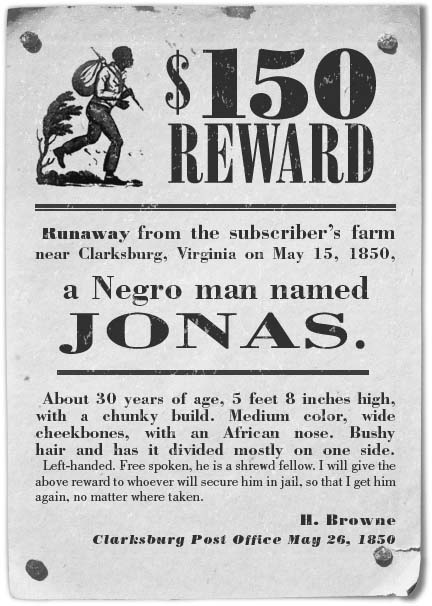
The description was remarkably specific. She pictured the man she had seen in the lean-to. Now that there were words for what he looked like, adjectives like chunky and African and shrewd, she could picture him, his calculating eyes taking her in, the strength in his shoulders – and his hair, bushy but parted on the side.
Donovan was watching her.
‘Walk on,’ Belle hissed, taking her arm and marching her around the corner on to Mechanics Street.
When they were out of earshot, Honor said, ‘Did Donovan put up that poster?’
‘Yes. He’s a slave hunter. You worked that out, didn’t you?’
Honor nodded, though she did not know there was a name for what he did.
‘There’s slave hunters all over Ohio, come up from Kentucky or Virginia to try and take back Negroes to their owners. See, we got lots of runaways through here on their way to Canada. In fact, a lot of traffic comes through Ohio, one way or another. Hell, you can stand at the crossroads here and watch it. East to west you got settlers moving for more land. South to north you got runaway slaves looking for freedom. Funny how nobody wants to go south or east. It’s north and west that hold out some kind of promise.’
‘Why don’t the Negroes remain in Ohio? I thought there was no slavery here.’
‘Some do stop in Ohio – you’ll see free blacks in Oberlin – but freedom’s guaranteed in Canada. Different country, different laws, so slave hunters got no power there.
‘But Donovan’s interested in you,’ Belle continued. ‘Funny, usually he’s suspicious of Quakers. Likes to quote a politician who said Quakers won’t defend the country when there’s war, but are happy to interfere in people’s business when there’s peace. But it ain’t good to get his attention: once you do it ain’t easy to get rid of him. He’ll bother you over in Faithwell too. He’s a stubborn son of a bitch. I should know.’ At Honor’s questioning look, Belle smiled. ‘He’s my brother.’
She chuckled at the change in Honor’s face. ‘Two different fathers, so we don’t look much alike. We grew up in Kentucky. But our mother was English – Lincolnshire.’
A piece fitted into place. ‘Did she make the quilt on my bed?’
‘Yep. Donovan’s always tryin’ to take it back from me. He’s a mean son of a bitch. We gone in different directions, ain’t we, even if we both come north. Now, we better get back.’ Belle stopped in front of Honor. ‘Look, honey, I know you seen things goin’ on at my house, but it’s best if you don’t actually know anything. Then if Donovan asks, you don’t have to lie. Quakers ain’t supposed to lie, are they?’
Honor shook her head.
Belle took her arm and turned around to walk back towards the millinery shop. ‘Jesus H. Christ, I’m glad I’m not a Quaker. No whisky, no colour, no feathers, no lies. What is there left?’
‘No swearing, either,’ Honor added.
Belle burst out laughing.
Honor smiled. ‘We do call ourselves “the peculiar people”, for we know we must seem so to others.’
Belle was still chuckling, but stopped when they reached the hotel bar. Donovan was no longer there.

The next two days Honor sewed all day, first in the corner of the shop by the window during the morning, and on the back porch in the afternoon.


